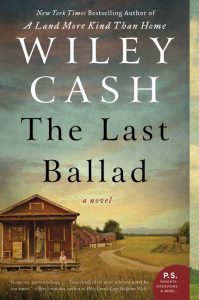The Last Ballad is the most recent book by author Wiley Cash. I was immediately drawn to the premise of this book because it was based on actual events that took place in Gastonia, North Carolina during the summer of 1929. I lived in North Carolina for six years and grew up in the South. So, I was interested to learn about the Loray Textile Mill Strikes of 1929.
The story centers around Ella May Wiggins who works at American Mill No. 2 in Bessemer City, North Carolina. She is 28 years old with four children to support after her husband ran out on the family the year before. She works a 72-hour work week for 9 dollars in stifling hot and cramped working conditions. In her pocket, she carries a crumpled leaflet for a union rally in nearby Gastonia. She scrawls song lyrics about her struggles on the back.
Through the eyes of several characters, Cash takes readers on a journey as Ella joins the union, leading workers towards equality and a living wage, decades before those terms would exist.
I’m not a huge fan of historical fiction, stories written from multiple perspectives, or female protagonists written by male authors, but this story really worked for me. Cash paints a vivid picture of a multi-layered textile industry ruled by class, gender, and race.
Through his rich prose, Cash gives a voice to those who may have not been able to speak for themselves and were thought of as inferior and unimportant by many. In The Last Ballad, Ella May’s voice was able to rise above the noise and capture the public’s attention.
There were a few superfluous characters that could have been downplayed or omitted all together. The ending felt a bit underdeveloped. However, that was probably because Ella May’s fate in The Last Ballad mirrored her actual life. It felt as though Cash wrote it with the expectation that the reader already knew what would happen. However, it would have been nice to have more detail about the lasting impact, if any, of Ella May’s work in the union. Also, the outcome of the rallies and strikes against the textile mills.
Even so, I thoroughly enjoyed this book. It’s a fictional portrayal of a piece of American history that is often overlooked. Ella May fought for workers rights, women’s rights, and integration in a time and place where such notions were not welcomed or accepted. She definitely deserves to have her own place in history.
Purchase Links
HarperCollins | Amazon | Barnes & Noble
 About The Last Ballad
About The Last Ballad
• Paperback: 416 pages
• Publisher: William Morrow Paperbacks; Reprint edition (June 5, 2018)
Named a Best Book of 2017 by the Chicago Public Library and the American Library Association
“Wiley Cash reveals the dignity and humanity of people asking for a fair shot in an unfair world.”
– Christina Baker Kline, author of A Piece of the World and Orphan Train
The New York Times bestselling author of the celebrated A Land More Kind Than Home and This Dark Road to Mercy returns with this eagerly awaited new novel. Set in the Appalachian foothills of North Carolina in 1929 and inspired by actual events. Thechronicle of an ordinary woman’s struggle for dignity and her rights in a textile mill, The Last Ballad is a moving tale of courage in the face of oppression and injustice, with the emotional power of Ron Rash’s Serena, Dennis Lehane’s The Given Day, and the unforgettable films Norma Rae and Silkwood.
Twelve times a week, Ella May Wiggins makes the two-mile trek to and from her job at American Mill No. 2 in Bessemer City, North Carolina. The insular community considers the mill’s owners—the newly arrived Goldberg brothers—white but not American and expects them to pay Ella May and other workers less because they toil alongside African Americans like Violet, Ella May’s best friend.
While the dirty, hazardous job at the mill earns Ella May a paltry nine dollars for seventy-two hours of work each week, it’s the only opportunity she has. Her no-good husband, John, has run off again, and she must keep her four young children alive with whatever work she can find.
When the union leaflets begin circulating, Ella May has a taste of hope. A yearning for the better life the organizers promise. But the mill owners claim the union is nothing but a front for the Bolshevik menace sweeping across Europe. To maintain their control, the owners will use every means in their power to prevent workers from banding together.
On the night of the county’s biggest rally, Ella May, weighing the costs of her choice, makes up her mind to join the movement—a decision that will have lasting consequences for her children, her friends, her town—indeed all that she loves.
Seventy-five years later, Ella May’s daughter Lilly, now an elderly woman, tells her nephew about his grandmother and the events that transformed their family. Illuminating the most painful corners of their history, she reveals, for the first time, the tragedy that befell Ella May after that fateful union meeting in 1929.
Intertwining myriad voices, Wiley Cash brings to life the heartbreak and bravery of the now forgotten struggle of the labor movement in early twentieth-century America—and pays tribute to the thousands of heroic women and men who risked their lives to win basic rights for all workers. Lyrical, heartbreaking, and haunting, this eloquent novel confirms Wiley Cash’s place among our nation’s finest writers.

© Mallory Brady Cash
About Wiley Cash
Wiley Cash is the award-winning and New York Times bestselling author of A Land More Kind Than Home. A native of North Carolina, he has held residency positions at Yaddo and The MacDowell Colony.
He teaches in the low-residency MFA program at Southern New Hampshire University. He and his wife live in Wilmington, North Carolina.
Find out more about Wiley at his website, and connect with him on Facebook and Twitter.



2 comments
[…] Wednesday, June 13th: Literary Quicksand […]
Thanks for being a part of the tour!